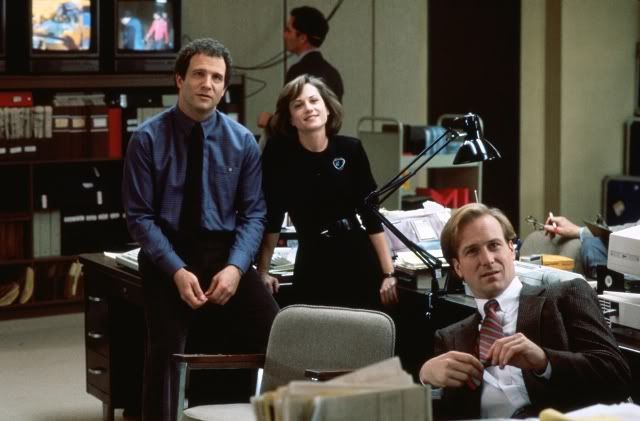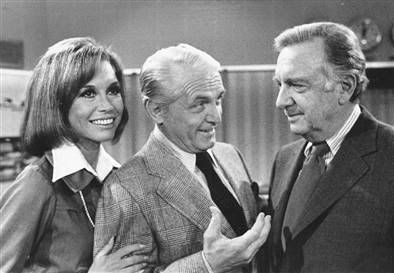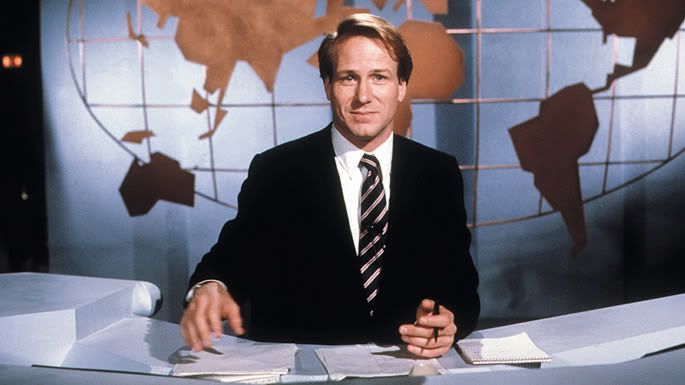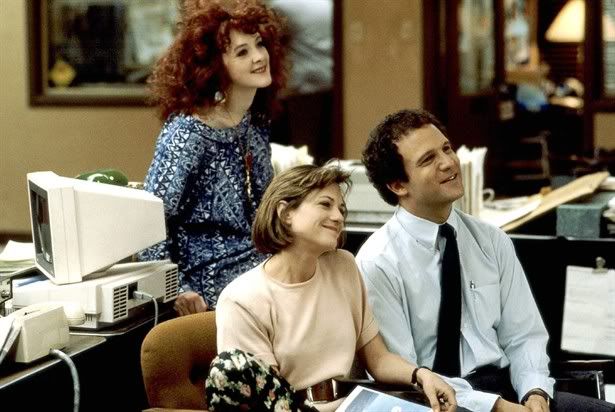
WHY I HADN'T SEEN IT
I'm as mystified as you. I have an encyclopedic knowledge of The Mary Tyler Moore Show, and at least in the description, this sounded a bit like the movie version of the same, also written by James L. Brooks, who wrote all my favorite episodes of MTM.
THOUGHTS
Broadcast News is often linked, unfairly in my opinion, to Network. For my money, it's the superior film. The satire is much more on-point; Network fires guns at far too many targets, to the point where the whole thing becomes a bit absurd. Network offers us wonderful lessons about our age (as I wrote about here), but the various subplots do not achieve the resonance of Howard Beale, orator for the ages.
Framed by a love triangle, Broadcast News keeps its theme simple: what is the state of journalism now? And what will it become? The future did not look bright, even in 1987.
Everything in the plot centers on these questions: on the surface the film's about Albert Brooks's wonk-ish journalist vs. William Hurt's vacuous anchorman, but Jane's slow transfer of her affections from one to the other isn't merely a statement on the peculiarities of love and loss. It's a statement on the debasement of her own values, occurring simultaneously with the debasement of broadcast journalism.
I AM JANE, CAREER WOMAN
Broadcast News features one of the best depictions of a "career woman" put to film. Despite decades of Hollywood and conservatives telling us otherwise, being a career woman doesn't actually mean you give up on all other life, or that you become shrewish or mean.
But of course James Brooks knows this, he created the first successful television show about a career woman, even managing to avoid weird misogynist traps like Bill Holden's speech to Faye Dunaway at the end of Network (again, I wrote about this here). (Now that I think about it, I could write an extremely long feminist critique of Network, as every last woman in power in that film is seen to be corrupt, laughable or dangerous. But those old men, they have principles.)

Jane is in many ways the logical product of everything Mary Richards fought for (through the course of the show, we see Mary fight for equal pay, her right to adult sexual relations outside of marriage, and most importantly, her right to find definition and meaning in her life without marrying and having children). In many ways, the show normalized a wider conception of femininity, allowing that women can focus on their careers and still be women.
The Mary Tyler Moore Show transformed societal thinking because television had unprecedented power at the time. When 25 percent of all households are watching your show every week, you really can change expected norms. Broadcast News similarly exists in a world where television has this kind of power. And it suggests that the cheapening of television can lead to the very cheapening of the viewer, making the viewer's tastes less discerning and more consumptive in nature. And Jane brings this to life, making an explicit choice of Pretty-But-Dumb over Intelligent-Erudite-But-Often-Depressing.

Of course, part of what makes the film great is William Hurt's performance as Tom the handsome anchorman. Tom's essential lack of intelligence is always right there in front of you, but like Jane, we want so badly to like him, and so we do. He is that charming, that attractive. So even when we learn the truth about his on-air duplicity, our instinct as the audience is to forgive, and we want Jane to forgive him as well, even though we know that it's wrong, that he's wrong for her, and so on.
OTHER NOTES
-I fell instantly in love with Holly Hunter's Jane, who is surely the prototype for Leslie Knope on Parks and Recreation. She's not a woman concerned abut having it all; she has it all, and will never lose it.
-Why do Mary and Holly have the same haircut? We're talking 1973 vs. 1987 here.
-How do you get Jack Nicholson to do a cameo in your film? Maybe he's not the egomaniac he's always seemed like. His quick appearances do resonate, however.
-Joan Cusack definitely deserves some kind of award for her general fashions in the film (look at that wonderful hair!):

ONCOMING FIRSTS
-First Holly Hunter film
-First James L. Brooks film
IN CLOSING
Do you want Jane to end up with Tom or not? Should she have dumped him or not?


i think jack may be paying james l brooks back for winning him an oscar for terms of endearment. according to imdb, jack did not want to be paid.
ReplyDeleteInteresting! I haven't seen Terms of Endearment as yet Isn't it a 3-hankie weepie?
ReplyDeletei haven't seen it either. it seems too much of an oscar baiting tearjerker for me.
ReplyDeleteand re: the ending, i think you are right on. being a huge albert brooks fan and my own moral values i feel like she should end up with brooks' character but yet the ending feels right in context.